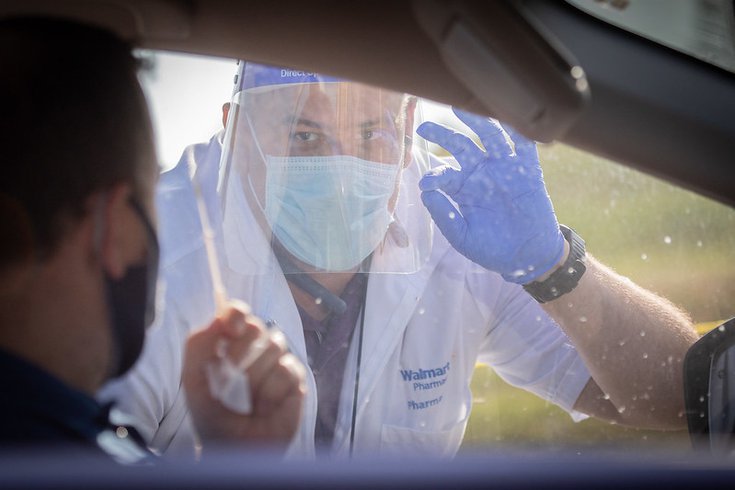
August 26, 2020
 Flickr/Gov. Tom Wolf's Office
Flickr/Gov. Tom Wolf's Office
New COVID-19 testing guidelines have drawn strong criticism from public health officials who fear they will hamper mitigation efforts. Above, a man gets tested at a COVID-19 testing site at the Walmart Supercenter in Elizabethville, Pennsylvania.
The Centers for Disease Control and Prevention has quietly changed its guidance on COVID-19 testing for people who have been exposed to the coronavirus but are asymptomatic.
Such people "do not necessarily need a test" unless they are considered vulnerable to severe complications, the guidelines now state. Instead, the guidelines focus on testing people who have known COVID-19 symptoms.
The change, made Monday, has some infectious disease experts worried that contact tracing efforts may be hampered by the new guideline, making outbreaks more difficult to control.
Dr. Leana Wen, an emergency physician at George Washington University and a previous health commissioner in Baltimore, told CNN's New Day, "I'm concerned that these recommendations suggest someone who has had substantial exposure to a person with COVID-19 now doesn't need to get tested."
She added, "This is key to contact tracing, especially given that up to 50% of all transmission is due to people who do not have symptoms. One wonders why these guidelines were changed – is it to justify continued deficit of testing?"
The guidance now states: "If you have been in close contact (within 6 feet) of a person with a COVID-19 infection for at least 15 minutes but do not have symptoms, you do not necessarily need a test unless you are a vulnerable individual or your health care provider or state or local public health officials recommend you take one."
Other exceptions include people who live or work in a nursing home or a long-term care facility, critical infrastructure workers, health care workers and first responders.
This marks a reversal from earlier guidance that recommended anyone in close contact with an infected person be tested. At a time when health experts are calling for expanded testing capability, this move from has caused some concern.
The CDC didn't offer any explanation for the change, but the U.S. Department of Health and Human Services insists that the guidelines will not hinder public health surveillance testing in any way.
"This guidance has been updated to reflect current evidence and best public health practices, and to further emphasize using CDC-approved prevention strategies to protect yourself, your family, and the most vulnerable of all ages," Dr. Brett Giroir, the HHS assistant secretary for health, said in a statement.
But any new evidence hasn't been presented or explained.
Since the beginning of the pandemic, public health officials have stressed the best way to keep community transmission low is through robust testing and contact tracing. And since the virus is often spread by asymptomatic carriers, that means testing all people with possible exposure.
Without testing every close contact, it will become more difficult to determine whether others have been infected and control any outbreaks, some public health experts said.
"It seems as though this new guidance is actively discouraging people from seeking testing, even if they have a known exposure," Angela Rasmussen, a research scientist at Columbia Public Health in New York City, told NBC News. "We need more testing, not less."
Alison Galvani, director for the Center for Infectious Disease Modeling and Analysis at the Yale School of Medicine, tweeted that asymptomatic spread underscores the need to test people anyone who has been exposed to COVID-19.
The CDC just revised their testing guidance to exclude people without symptoms. Our work on the ‘silent’ spread underscores the importance of testing people who have been exposed to #COVID-19 regardless of symptoms. This change in policy will kill. https://t.co/5zMctSS4wD
— Alison Galvani (@Alison_Galvani) August 26, 2020
"This change in policy will kill," Galvani tweeted.